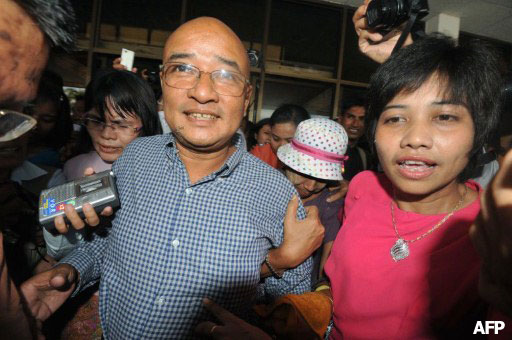Chiang Mai (Mizzima) – Forty-six Burmese political prisoners were included in a batch of more than 400 prisoners released from Obo Prison in Mandalay on Wednesday.

Myo Naing, a National League for Democracy division-level organizer, said nine Buddhist monks, one former military intelligence officer, one former captain, two prisoners convicted of bombings, 13 prisoners convicted of religious riots in Kyaukse and five NLD members are among the freed political prisoners.
The imprisoned Burmese comedian Zarganar was released from Myitkyina Prison on Wednesday morning and was in route to Rangoon by air, according to Zarganar’s sister-in-law Ma Nyein.
Zarganar (aka) Thura was serving 35 years in prison.
“He is in good health,” Ma Nyein told Mizzima. “He said he could not say anything, and told me to greet everyone [on his behalf].”
Zarganar was arrested in 2008 while doing volunteer work to aid Cyclone Nargis victims.
Zarganar said, "I am not happy at all, as none of my 14 so-called political prisoner friends from Myitkyina Prison are among those freed today. I will be happy, and I will thank the government only when all of my friends are freed,” according to the Associated Press.
Reaction to Zarganar's release reverberated around the world. American sculptor Jim McNalis, who recently completed a bust of the comedian and satirist, said from Chiang Mai: “We are so filled with joy that we are dancing and singing.”
On Tuesday, state-run TV announced a presidential amnesty, saying 6,359 prisoners would be released starting Wednesday under an amnesty granted by President Thein Sein. An earlier amnesty of prisoners was granted in May.
Those released include the aged, the sick and the handicapped. It is not known how many political prisoners will be included in the release, but observers say the number could be as high as 300.
The release of political prisoners has been a point of priority by Western governments who have linked economic sanctions to the release of political prisoners and democratic reforms. The second amnesty is seen as one of several recent steps by the government to move cautiously toward more democracy in the country, which as been ruled by the military for decades.
Agence France-Presse quoted a top US official, Kurt Campbell, on Monday saying that recent governmental developments in Burma included what he described as a "very consequential dialogue" between opposition leader Aung San Suu Kyi and the Burmese leadership.
Campbell, one of several US officials to meet with Burmese Foreign Minister Wunna Maung Lwin in Washington recently, said, "It is also undeniably the case that there are dramatic developments under way.”
The U.S. government has continued both diplomatic engagement and continued economic sanctions against Burma.
"We have made clear our desire to see continued progress on issues such as prisoner releases," Campbell, the US Assistant Secretary of State for East Asian and Pacific Affairs, said at a Bangkok lecture on Monday.
He hinted that concrete moves towards democracy by Burma could lead to an easing of sanctions.
"We will match their steps with comparable steps," he said, according to AFP.
Among the Burmese governments steps toward national reconciliation and a bow to public opinion in the authoritarian nation, was the suspension of construction of a controversial mega-dam, risking the anger of traditional ally China that is backing the project.
Suu Kyi, whose party won the 1990 elections by a landslide but was never allowed to take power, has said she believes Thein Sein genuinely wants to push through reforms, but she cautioned it was too soon to say whether he would succeed, according to AFP.
Burmese leaders are believed to be taking steps to gain more independence from China and forge improved ties with Western countries, which observers say could help counter popular resentment of its domination of the newly formed Parliament and also increase its chances of taking a more normal role in regional affairs.
Observers say other factors play into its desire to open up, including a need for technical assistance from the World Bank and the International Monetary Fund, and other multilateral institutions which cut off ties decades ago in response to human rights abuses.
Burma’s economy is in a shambles and the budget gives a miniscule amount to education and public health, in spite of its rich natural resources from gems to timber to oil and natural gas.



